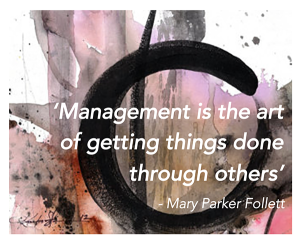LEADERSHIP is about enabling the emergence of possible futures.
MANAGEMENT is about enabling the presence of those possible futures.
The five characteristics of enabling management – why PURPOSEFUL, INCLUSIVE, HUMBLE, COLLABORATIVE and CARING management enables an organisational community to successfully navigate disruptive change.
My recent post profiled enabling leadership as an opportunity for communities to share the ‘leadership’ of an emerging future. This post frames enabling management as the natural ally of enabling leadership, a way for communities to ‘manage’ the implementation of that future.
It is almost a century since Mary Parker Follett observed that ‘management is the art of getting things done through others’. But, thanks to decades of traditional military-style command and control leadership, and the influence of this leadership style on sustaining an aligned controlling and directive style of management, one could be forgiven for thinking that successful management has been (and perhaps continues to be) more about getting things done by others rather than through others. Although leadership and management conversations continue to emphasise the potential of networking, teaming and collaboration as a more effective way to ‘get things done’, the reality for many (perhaps most) organisations is that these adaptive ways of working are often frustrated by the decision hierarchies of control and command management.
There seems to be a reluctance to trust participative management to make the ‘right’ decisions, especially in times where the organisational model is challenged by significant change. Ironically, at times when the organisation needs to be more open and flexible, it is often ‘shut down’ by reactive management which clings to autocratic and directive decision making in an attempt to control-manage the organisation’s change response.
This directive-management behaviour ‘reminds’ the people engaged in collaboration, teaming and networking that their activities are optional rather than essential to the sustainability of the organisation. It devalues organisational learning and diminishes the opportunity for engaging the collective knowledge and wisdom of the organisational community – the opportunity to co-create an innovative change response.
Clearly we need effective decision systems to order organisational activity, but these systems need to enable, guide and support community interaction and decision making, not stifle it. Just because organisational decision-pathways need to be clear (transparent and accountable) does not mean they cannot also be flexible (open and consultative).
Unfortunately, command and control management (like its leadership ally) seems to be very much alive but perhaps (hopefully) not so well. As organisations and communities face increasing global challenges from political, socio-economic and technological change, the more traditional management response of increasing the effectiveness and efficiency of existing organisational operating models will simply not ‘cut the mustard’.
Accommodating change by continually refining, reorganising and refocussing existing operational models has significant limitations, including the catch-up, retro-fit nature of this activity, which attempts to apply yesterday’s predictive (and often reactive) response to address the challenge of tomorrow’s unpredictable change. Successful change is enabled not managed.
The traditional directive-style of management will always be found wanting in an environment where the future is increasingly unpredictable. Contemporary management must have an adaptive capacity, a facility to synthesise (anticipate, analyse and successfully integrate) emergent change as a normal operational event. And to allow that adaptive capacity to flourish, contemporary management must also embrace a collaborative decision system that enables and encourages the emergence of change opportunities, while at the same time providing an effective framework for managing the change response.
The challenge is to resolve the natural tensions that exist between a desire to remain open to the possibility of a different future (to be adaptive) and the need to reduce the uncertainty of that future (to make decisions). The opportunity is to reframe management as a practice that enables outcomes rather than a process that gets outcomes; to adopt an adaptive+collaborative style of management that promotes collaborative learning and decision-making as a way of co-creating more sustainable community outcomes.
To understand what I mean by adaptive+collaborative management (a term borrowed from the natural resources sector), or what I would prefer to call enabling management, consider the following key principles that could frame its application within our organisations and communities:
Enabling management knows that why is more important than how.
Enabling managers are clear about the raison d’être of their organisation. They understand that clarity of purpose provides the organisational confidence to embrace disruptive change as a normal event in an emerging future. They know that a committed community of purpose can sustain multiple and changing versions of their future provided those futures present valid manifestations of their purpose. The role of enabling managers is firstly to ‘be on purpose’, to be trusted custodians of ‘why’, and secondly to facilitate (not direct or control) ‘what’ that future could be, and ‘how’ it can be realised.Enabling management is PURPOSEFUL.
Enabling managers know that ‘why?’ is also an extremely important question for ‘their people’. That’s why they spend quality time with their people, exploring the opportunities to align ‘who they are with what they do’ – exploring the opportunity for each individual to make a meaningful contribution to a shared future. These conversations can only be facilitated by people who live their own life on purpose, who presence their true self in the service of others. Enabling managers are authentic people.
Enabling management appreciates the potential of community.
Enabling managers know that the strength and vitality of their community is dependent on its connectedness; that the community’s adaptive capacity is enabled by open, flexible and resilient community networks that facilitate organisational learning. They understand that those networks are secured by meaningful relationships that bind the community and interconnect its diversity. The role of enabling managers is to facilitate the development of those relationships, and the networks they enable, by hosting the conversations that engage the whole community in the collaborative co-creation of its future. Enabling management is INCLUSIVE.
Enabling managers understand that community cannot be imposed, that it is a social construct built on the voluntary commitment of people who share a common purpose. They know that the potential value of community lies in the quality of the relationships that enable it. That’s why they spend time connecting ‘their people’, helping them to see the possibilities and benefits of a shared (connected) future. Enabling managers connect their people.
Enabling management knows what it doesn’t know.
Enabling managers value the collective knowledge and experience of their organisational community. They know that the wisdom of their community, which far exceeds their own knowing, is their most valuable resource. They also know that by listening to the many different and diverse voices within their community they will understand its co-creative potential; and by simply asking for help they can engage that potential for the benefit of the whole community. The role of enabling managers is to unlock the potential of their community, to facilitate opportunities for collaborative learning that enable the community to ‘know what it knows’ and to engage its full capacity to embrace disruptive change. Enabling managers value the knowledge, experience and wisdom of their colleagues; they learn with and through their community. Enabling management is HUMBLE.
Enabling managers appreciate that individual potential, including their own, is released through collaborative learning. That’s why they create coaching, mentoring and teaming opportunities for ‘their people’; facilitating learning pathways that build co-creative partnerships and networks by enabling and encouraging learning with and through others. Enabling managers understand that every encounter is a learning opportunity – but they never presume to be the teacher nor expect to be the pupil. Enabling managers learn with their people.
Enabling management facilitates ‘win-win’ outcomes.
Enabling managers believe in teaming to get things done. They know that effective collaboration not only expands the opportunity for community participation and organisational learning; it also increases the potential for generating the win-win outcomes that sustain productive community engagement, and therefore, sustain community. By facilitating opportunities for the community to co-create a shared future, enabling managers build a culture of collaborative community, a way of working together that preferences the creation of equitable-shared value for the whole community. Enabling management is COLLABORATIVE.
Enabling managers understand that effective teaming depends on individual commitment to the team agenda; a commitment that is enabled by a shared team goal or objective (purpose), but only realised when team members feel ‘valued’ by their team. That’s why enabling managers make sure that ‘their people’ have an opportunity to contribute (to add value) and that their individual contribution is recognised (valued) by their colleagues. Enabling managers value their people.
Enabling management cares about the wellbeing of its community.
Enabling managers understand that the resilience of their community, its ability to deal positively with adversity and disruptive change, depends on paying attention to the collective wellbeing of ‘their people’. They know that a resilient community is one where people feel that their social, cultural, economic and environmental needs are being met; where their individual humanity is valued and nourished by the community. Enabling managers know who ‘their people’ are; they see beyond the needs of the community to appreciate and acknowledge the needs of the individual; they understand that personal growth fuels community growth. Enabling management CARES about their people.
Enabling managers understand that community wellbeing is dependent on individual wellbeing. They know that individual wellbeing is enhanced where people can find personal meaning in the work they do within their community. That’s why enabling managers welcome the whole person to their community, why they find ways to accommodate personal agendas and ambitions, and why they make time for conversations that connect individual and community aspirations. Enabling managers nurture their people.
The principles of enabling management are derived from the The Congruence Framework. They embody the four essential conditions and the five factors for achieving organisational congruence – loosely defined as ‘the harmonious alignment between individuals and their organisations and communities’ – The Congruence Framework.



Leave A Comment